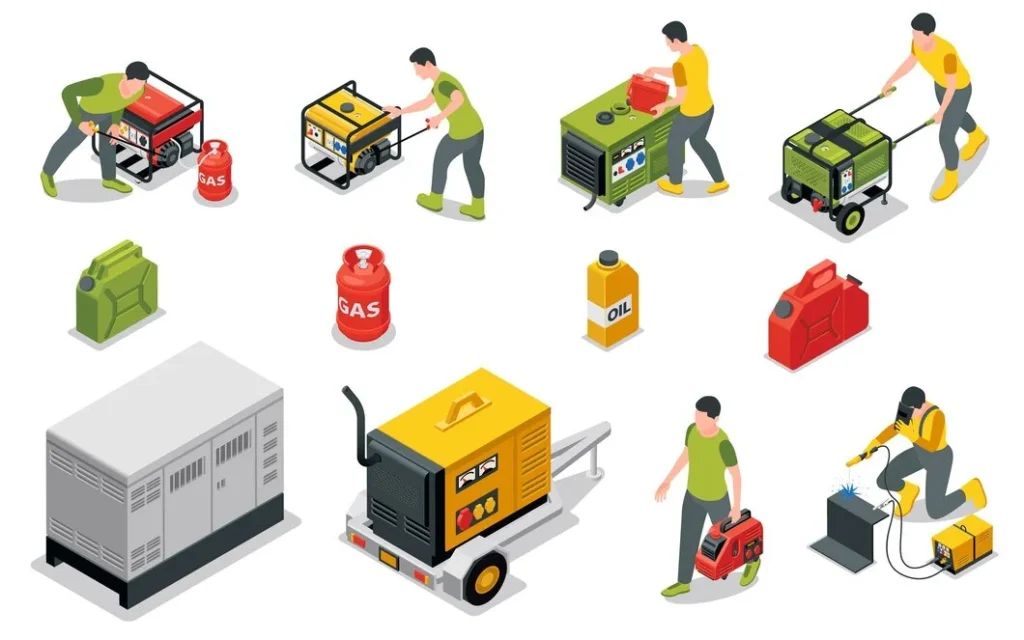The quietest generator may be entirely inappropriate for your needs.
For job sites or emergencies, backup power is required. While camping, you might want electricity. These issues can be resolved with a portable generator, but choosing the incorrect model will cost you money and time.
Two primary options dominate the market: inverter generators and traditional portable generators. Conventional models are inexpensive and have a lot of power. Although they consume less fuel and operate more quietly, inverter units are more expensive initially.
Your decision will determine what you’re powering and where you plan to use it. This guide deconstructs the two types to help you choose the best generator for your needs.
Discover insights that matter—dive into our Related Post for expert tips today!
What Is a Conventional Portable Generator?
The most common type of generator is a conventional generator. It has an alternator coupled to a gas engine. Regardless of what you’re powering, the engine runs at 3600 RPM.
It operates at the same speed whether you plug in a large refrigerator or a single light. This makes purchasing these portable generators easy and affordable. They are excellent for backup power at home or on building sites where a lot of electricity is required.
What Is an Inverter Generator?

A more sophisticated type is an inverter generator. To clean up the power, they follow three steps. They generate AC power first. After that, they change it to DC. Finally, they switch it back to clean AC power.
Like your home outlets, this produces pure sine wave electricity. Depending on your needs, the engine accelerates or decelerates. They are ideal for camping trips because they reduce noise and use less gas.
How to Choose the Best Generator for Your Needs
When selecting a generator, it is best to ask yourself the following questions:
How Much Power Do You Need?
How much power you need is the most critical question. Watts are used to measure power.
Ordinary generators are powerful. They provide between 3,000 and 10,000 watts or more.
During outages, you have enough electricity to run your air conditioner, sump pump, and refrigerator simultaneously.
Inverter generators best serve smaller needs. Most provide 1,000–4,000 watts. Larger models are far more expensive.
List the things you wish to power. Total the watts that each gadget consumes. Keep in mind that motors require additional power to start.
Here’s an illustration:
Your refrigerator requires 1,600 watts to start, but 800 watts to run. A laptop consumes fifty watts. Five LED lights use fifty watts. A generator capable of handling 1,600 watts of peak demand is required.
Which One Saves More Gas?
During extended outages, fuel efficiency impacts how frequently you refuel and how much money you spend.
Here, inverter generators prevail. Depending on what you’re using, they modify engine speed. Can you power a phone charger and a few lights? The engine sips gas and slows down. They become 20–40% more efficient as a result. One gallon powers a small inverter for eight to ten hours.
Standard generators are continuously operating at maximum capacity. Even when you’re not using much power, they burn gas quickly. At 50% capacity or more, they function at their best. They quickly run out of fuel and waste tons for small loads.
How Loud Will It Be?

Nobody wants other campers or neighbors to be disturbed by a loud generator.
Inverter generators operate quietly because of their smaller engines, sound-dampening, and intelligent throttles. They run at 50–60 dB, roughly the volume of a typical conversation. They are therefore ideal for parks, campgrounds, and residential areas where noise is an issue.
Conventional generators have a bad reputation for being noisy. Their engines always run at full speed, producing noise levels of 65 to 80 dB or higher. It’s comparable to a busy street or a vacuum cleaner. They function perfectly on building sites, but when used in the backyard or on camping trips, they irritate everyone.
Can You Move It Around Easily?
Weight is crucial if you have to move your generator frequently.
Inverter generators are designed to be portable. They have suitcase-style handles and are lighter and smaller. One person can easily handle it because the average model weighs 45 to 55 pounds.
Conventional generators are considerably bulkier and heavier. The weight of a 5,000-watt model is more than 200 pounds. They are difficult to lift and move, even with handles and wheels. They function best when stationary.
How Much Will It Cost You?
These two types differ significantly in price.
You get more power for your money with a regular generator. The price of a 2,200-watt inverter is comparable to that of a 5,000-watt regular model. Regular generators are the best option for pure power on a limited budget.
Because of their quiet technology and intricate parts, inverter generators are more expensive up front. However, over time, improved fuel efficiency could result in financial savings. Lower gas prices frequently break even for regular users.
Is Power Quality Important?
Power quality is more important than most people realize.
Ordinary generators use electrical fluctuations to produce “dirty” power. For simple tools and heaters, this works perfectly. However, it could harm your gaming console, TV, phone, or laptop. To be safe, you would need a good surge protector.
Like your home outlets, inverter generators produce clean electricity. This steady electricity protects sensitive electronics.
According to recent research, this clean power is necessary for EV chargers and smart home appliances to function correctly.
Inverter generators are the safest option for powering anything more sophisticated than simple tools.
When Is It Better to Purchase an Inverter Generator or a Conventional Generator?

Select an inverter generator if you require:
Safe power for medical devices, TVs, phones, and laptops. Running quietly in neighborhoods or while camping. Longer runtimes and improved gas efficiency. Lightweight design that is easy to carry.
Select a conventional generator if you require:
Plenty of power for large household appliances like well pumps or heavy tools. Get the most power for your money without worrying about noise – a stationary backup system for your home.
Conclusion
What matters most to you will determine which generator you choose. Consider your intended use, the devices you need to power, and your financial constraints. Portability and noise levels are also important.
Before you go shopping, make a list of the features you absolutely must have. Compare them to the benefits and drawbacks of each generator type. Following this easy step, you can choose a generator that will last many years and meet your unique needs.
Don’t miss out! Check our Featured Post for trends and strategies shaping your field.







